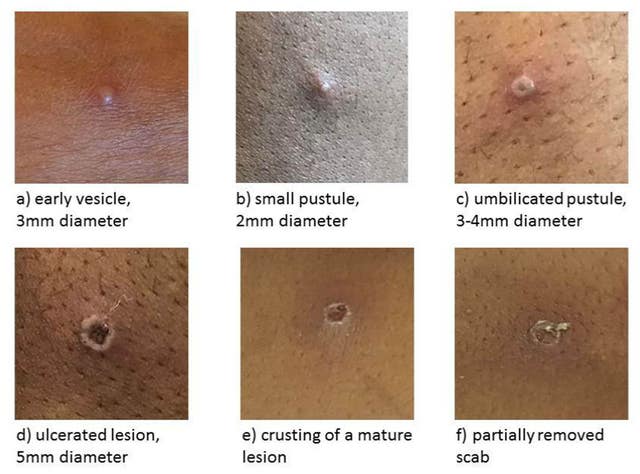
Some 20 cases of monkeypox virus have been confirmed in the UK, though officials expect that number to rise.
– What is monkeypox?
Monkeypox cases are usually found in West Africa, and the virus does not often spread elsewhere.
That is why outbreaks reported in Europe, Canada, Australia and the United States have cased alarm among public health experts.
The disease, which was first discovered in monkeys, is usually mild but can cause severe illness in some cases.
– What are the symptoms?
Symptoms of monkeypox include fever, headache, muscle aches, backache, swollen lymph nodes, chills and exhaustion.
A rash can develop, often beginning on the face, which then spreads to other parts of the body including the genitals.
The rash can look like chickenpox or syphilis, and scabs can form which then fall off.
The incubation period of monkeypox is usually from six to 13 days but can range from five to 21 days.
– What has happened in the UK?
To date, there are 20 cases in the UK, with the initial case having returned from travel to Nigeria.
The World Health Organisation (WHO) says that, based on currently available information, some people are catching the infection in the UK.
It is understood to be convening emergency meetings on the issue.
As of May 15, two confirmed cases in the UK were in the same family (these were unconnected to the initial case).
Separately, six other cases have been confirmed in gay, bisexual, and other men who have sex with men who have attended sexual health services.

Two of these cases have known contacts in common. There has been no update on the location or nature of the 11 new cases announced on Friday.
Monkeypox is not normally a sexually-transmitted infection, but it can be passed on by direct contact during sex.
It can also be spread through touching clothing, bedding or towels used by someone with the monkeypox rash, and through the coughs and sneezes of somebody with the infection.
– What does the UK Health Security Agency say?
The virus spreads through close contact and the UKHSA is advising people, particularly those who are gay, bisexual or who have sex with men, to be alert to any unusual rashes or lesions on any part of their body.
Anyone who is worried is advised to contact sexual health services and to call ahead for an appointment, or to call 111.
The UKHSA said the virus does not usually spread easily between people and the risk to the UK population overall remains low.
It is carrying out contact tracing of people who have been in close contact with the affected.
The smallpox vaccine, which has effectiveness against monkeypox, is being offered to some people who have had close contact with affected individuals.


Comments: Our rules
We want our comments to be a lively and valuable part of our community - a place where readers can debate and engage with the most important local issues. The ability to comment on our stories is a privilege, not a right, however, and that privilege may be withdrawn if it is abused or misused.
Please report any comments that break our rules.
Read the rules hereLast Updated:
Report this comment Cancel